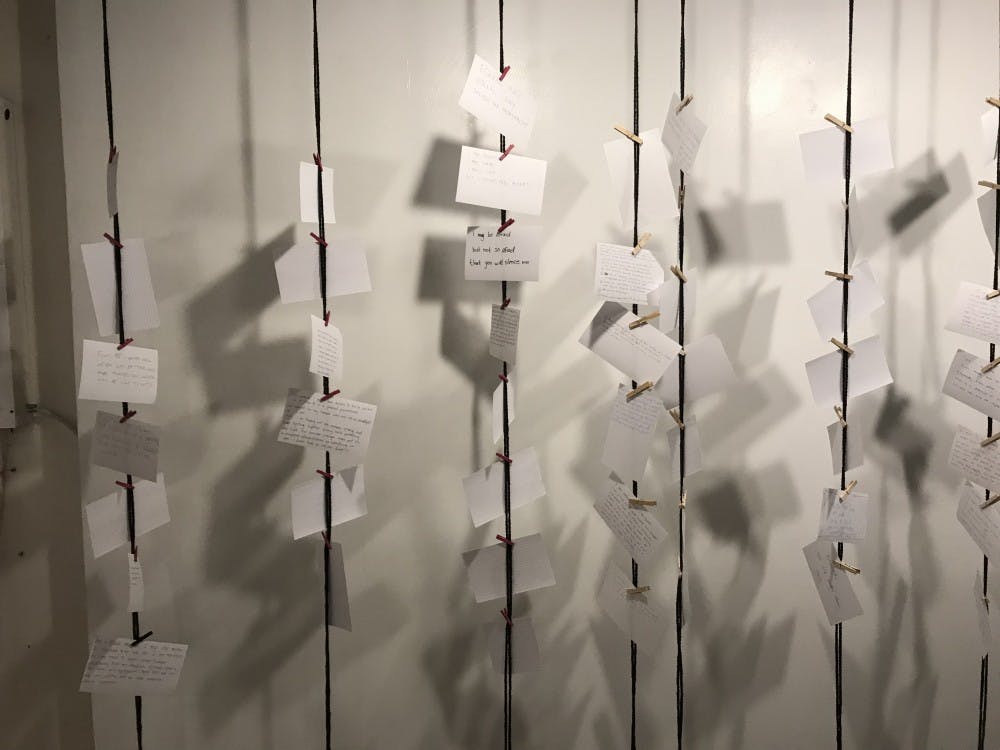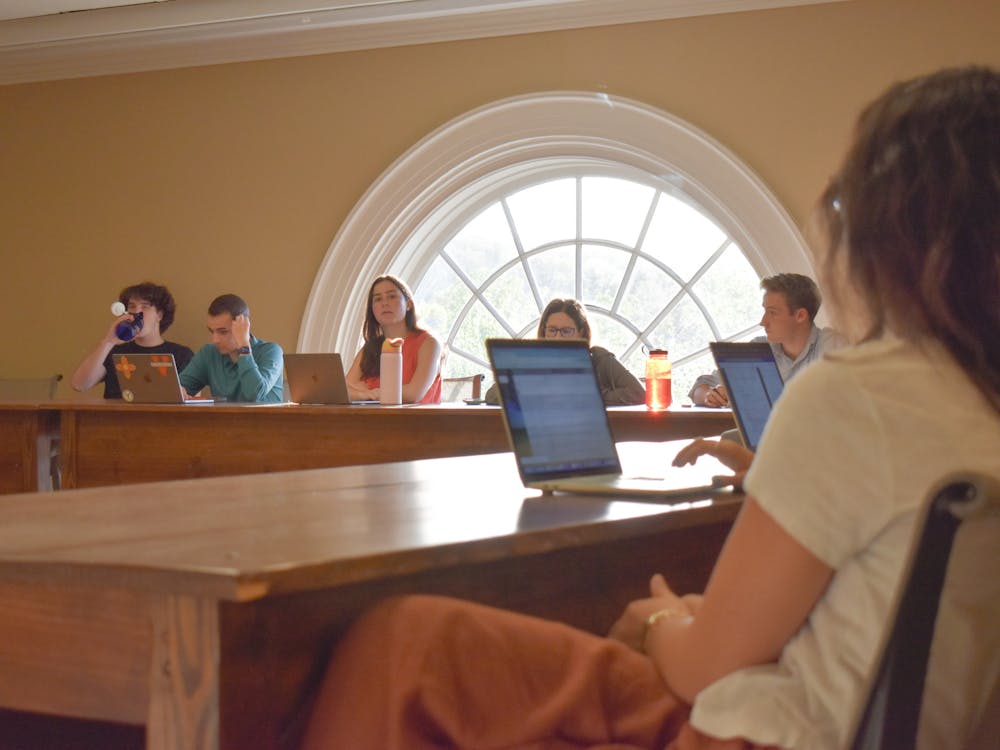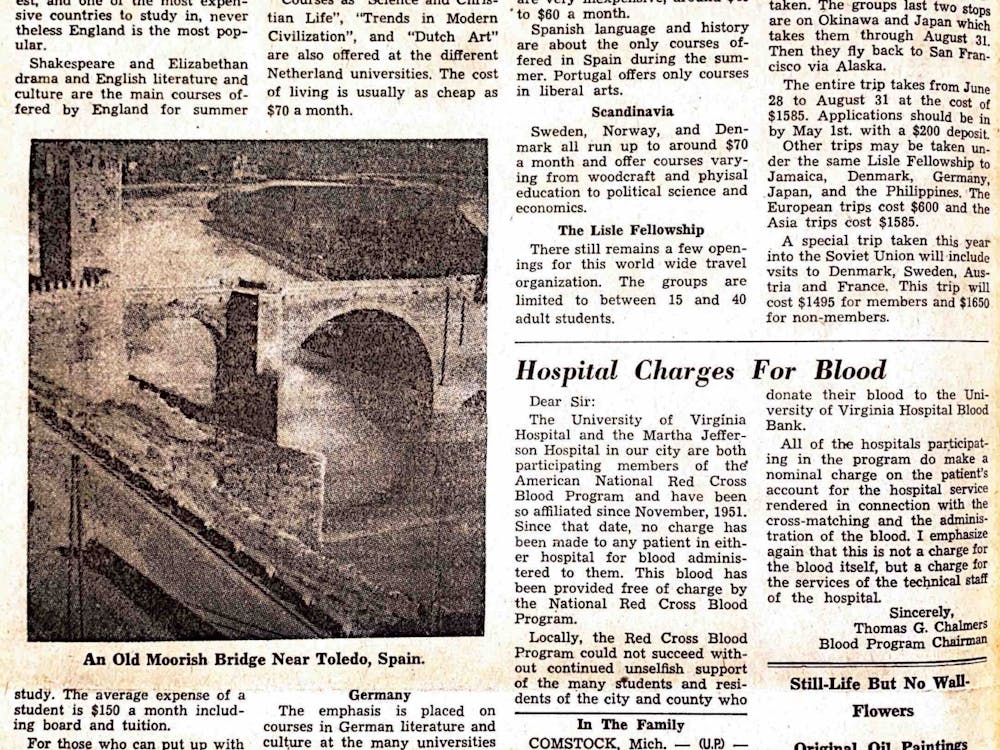The Solidarity Cards Project exhibition opened last weekend at The Bridge Progressive Arts Initiative in Downtown Charlottesville. At around 5:30 p.m., visitors were first permitted to enter the building displaying the project.
Destinee Wright, a 2017 University alumna with a degree in Women, Gender and Sexuality, created the project in the aftermath of the 2016 presidential election.
After the election of President Donald Trump, Wright went to an event called “Linking Together in Uncertain Times.” The event, hosted by the Office of African-American Affairs at the University brought together a variety of students and faculty to provide a support network of fellow community members. At the event, Wright noted how lots of people of color seemed distressed by the results, and decided to attempt to transfer their emotions onto paper.
“I was like, ‘What a great way to capture these responses and encourage people to write down their thoughts to get it out of [their head] and onto paper and maybe encourage some solidarity in them by having them write it down and other people see their responses,’” Wright said.
Wright was inspired to create the Solidarity Cards Project by a similar art project.
“I took a Latin American women artist class at U.Va. my fourth-year and we learned about an artist named Mónica Mayer who did a similar clothesline project to address sexual assault anonymously in Mexico City,” she said. Wright also noted that her instructor for the course, Dr. Alberto McKelligan Hernandez, was “super supportive” and “a big part” of her project.
Mayer’s work became nationally relevant this year with accusations of sexual assault and misconduct rocking the art and entertainment industry. According to The Washington Post, Mayer debuted another version of her cards project at the National Museum of Women in the Arts at Washington that closed Jan. 5.
In this variant, people entered Mayer’s exhibit, and were able to contribute to by answering questions posed by pink slips of paper. These included, “As a woman, have you ever experienced violence or harassment? What happened?”, “How do you recover your joy after going through an experience of violence?” and “What have you done or what could you do to stop violence against women?”
Mayer’s exhibit proved highly successful, with hundreds of responses received after only a few days.
Wright began collecting cards in November of last year, and in April began promoting her work to gather attention for her project.
“I’ve been actively reaching out starting in like April, which is when I first really started sending out some emails and getting people to see these cards and find a place to display them,” Wright said. “And so it wasn’t until recently when I’ve had like 300 when they’re like, ‘Oh yeah okay.’”
Wright found a gallery in which she could display her work in the Bridge Progressive Arts Initiative.
“[Wright] approached The Bridge the way many artists do, as a community member with an idea, and determination to see that idea come alive,” Alan Goffinski, director of BPI, said in an email to The Cavalier Daily. “We don’t like saying ‘no’ to creative ideas, so we really let her run with her vision for the exhibit.”
Upon entering the building, a quick glance around the compact room revealed over 300 cards attached to black strings hanging from the ceiling with clothes pins.
Each card was written by a different person in response to the 2016 election. Participants anonymously — though some chose to add their names — wrote down their thoughts in regards to the direction of America, the state of politics or anything else on their mind.
Different colored clothespins denoted different groups from which Wright gathered the responses.
“The [2017] Women’s March is in pink . . . those are all the responses I collected after the March,” Wright said. “The red ones are [from Aug. 12].”
Wright was referring to the deadly Aug. 12 Unite the Right rally, when white supremacists marched downtown to protest the removal of the Robert E. Lee statue. The event ultimately resulted in numerous injuries and killed 32-year-old Heather Heyer after a car plowed into crowd of counter-protesters.
“I had a lot of reservations about going to [Aug.] 12, but I wanted to go and support my friends, but I was kind of a little nervous to collect responses there,” Wright said. “I didn’t feel like it was the right place to do that, but something told me to see if people were open to doing it.”
Wright has collected responses from people attending several community events as well, such as the Virginia Film Festival, City Council meetings and the Healing through Art community event, but she said she always asks after the events end.
“When I go to events I try to collect responses after the event so people can reflect in a way,” Wright said. “I thought they were good places where people were already kind of thinking about how they were feeling, or were already in a reflective mode, so I thought those would be good places to get responses from because people were already kind of thinking about these issues.”
The attitudes of the note card responses varied along the emotional spectrum. Some appeared frustrated and angry, saying things such as “I’m fearful for a regression in women’s progress.”
Many others expressed hope and optimism, with thoughts like, “I may be afraid, but not so afraid that you will silence me” and “Trump cannot take away our humanity.” Although many were responses to the election of Trump, several cards addressed other contemporary issues like gun control and sexual harassment.
Exhibit visitors were able to walk freely and interact with the project while enjoying a beverage and snacks, and even contribute with a card of their own.
Wright, who is from Richmond, is also a small business owner, running a home-based hair-styling company.
Wright’s future projects include a workshop on Feb. 24 through the University’s Carter G. Woodson Institute to address erasure and silencing that happens in the black community. This will be open to anyone.
Wright also said she hopes to build on her Solidarity Cards Project by visiting local businesses and asking them to erect mini pop-up installations of her project. These may look like a pile of index cards on which people could respond to a prompt — similar to Mayer’s project — and leave their response hanging on a string by a clothespin.





